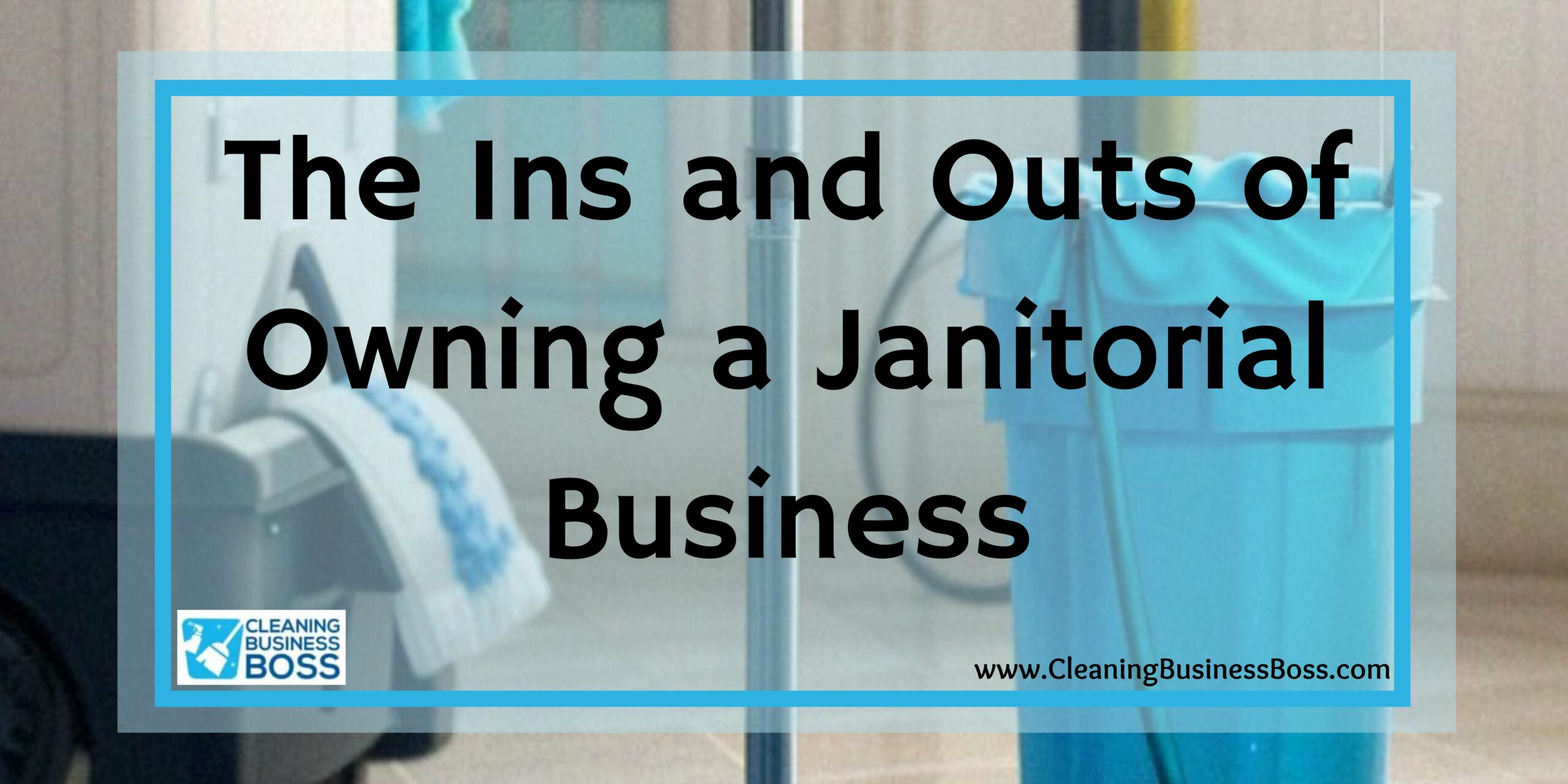Owning a janitorial business can be a rewarding venture for entrepreneurs looking to enter the service industry. This article will provide an overview of the key aspects involved in starting and managing a janitorial business.
Owning a janitorial business requires meticulous planning, a reliable workforce, and a commitment to exceptional service. Position your business for success by understanding the industry, developing a solid business plan, and delivering top-notch cleaning solutions.
Understanding the Janitorial Services Industry

To embark on a successful journey as a janitorial business owner, it is essential to gain a comprehensive understanding of the industry landscape. This knowledge will empower you to make informed decisions and effectively navigate the competitive market.
In this exploration, we will delve into the diverse aspects of the janitorial services sector. Firstly, we will analyze the market size and growth potential of the industry. Understanding the market’s scope and trajectory will help you assess the opportunities and challenges that lie ahead.
Next, we will shed light on the different types of janitorial services available. This includes commercial cleaning, which caters to businesses, offices, and institutions, as well as residential cleaning that focuses on homes and apartments. Additionally, specialized cleaning services such as post-construction cleaning, carpet cleaning, and industrial cleaning will be explored.
Furthermore, identifying your target clientele is vital. By understanding the specific needs and expectations of different customer segments, you can tailor your services to meet their requirements effectively. This customer-centric approach will contribute to customer satisfaction and loyalty.
Moreover, recognizing the competitive landscape is crucial for positioning your business strategically. Analyzing competitors, their strengths, weaknesses, and market positioning can help you identify opportunities to differentiate your janitorial business. Discovering your unique selling propositions (USPs), such as eco-friendly practices, advanced cleaning techniques, or exceptional customer service, will enable you to stand out in the market.
By gaining a firm grasp of the janitorial services industry, including its market dynamics, service types, target clientele, and competitive landscape, you will be equipped with valuable insights to shape your business strategy and pave the way for success.
Developing a Business Plan
A well-structured business plan serves as the bedrock for a successful janitorial venture. It provides a roadmap that guides your business decisions and actions, ensuring a clear direction for long-term growth. In this section, we will explore the key components that make up a comprehensive janitorial business plan.
First and foremost, your business plan should clearly define your objectives and mission statement. This helps establish the purpose and vision of your janitorial business, providing a solid foundation for all your activities. It sets the tone for your company culture and guides your decision-making process.
Conducting thorough market research is another crucial aspect of your business plan. This involves analyzing the industry landscape, identifying target markets, and understanding customer needs and preferences. By gaining insights into market trends, competition, and potential growth areas, you can position your business strategically and tailor your services to meet customer demands.
Pricing strategies play a significant role in your business plan. Determining competitive and profitable pricing models ensures that your janitorial services are priced appropriately in the market. Factors such as overhead costs, labor expenses, and desired profit margins should be considered when formulating your pricing strategy.
Your business plan should also outline your marketing plans to attract and retain clients. This includes defining your target audience, developing a strong brand identity, and implementing effective marketing tactics. A well-executed marketing plan helps you build awareness, generate leads, and differentiate your janitorial business from competitors.
Financial projections are a vital component of your business plan, providing a realistic outlook for your company’s financial performance. This includes estimating startup costs, projecting revenue and expenses, and conducting profitability analysis. Having a clear understanding of your financials enables you to make informed decisions, secure funding if necessary, and track your business’s financial health.
Crafting a robust business plan for your janitorial business not only helps you navigate the initial stages but also provides a roadmap for future growth and success. It allows you to set goals, make informed decisions, and monitor your progress along the way. With a well-structured business plan in place, you can confidently move forward with your janitorial venture.
Start your window cleaning right by checking out article about it.
Legal and Regulatory Considerations
Compliance with legal and regulatory requirements is a fundamental aspect of owning a janitorial business. Understanding and adhering to these obligations is crucial for safeguarding your business, maintaining a positive reputation, and ensuring a smooth operation.
One of the first legal considerations is business registration and licensing. Depending on your jurisdiction, you may need to register your janitorial business with the appropriate government authorities and obtain the necessary licenses or permits. This ensures that you are operating legally and in compliance with local regulations.
Insurance requirements are also paramount. It is essential to secure appropriate insurance coverage to protect your business from potential risks and liabilities. Liability insurance safeguards you against claims arising from property damage or injuries that may occur during your janitorial services. Additionally, workers’ compensation insurance provides coverage for your employees in case of work-related injuries or illnesses.
Complying with employment regulations is vital when hiring and managing your workforce. This includes understanding labor laws, minimum wage requirements, and proper classification of employees. Adhering to fair employment practices, such as non-discrimination, equal opportunity, and proper payroll management, is crucial to maintaining a healthy work environment and avoiding legal disputes.
Moreover, adhering to health and safety standards is of utmost importance in the janitorial industry. Implementing proper safety protocols, providing necessary training, and ensuring the use of personal protective equipment (PPE) are essential to protect the well-being of your employees and clients. Additionally, understanding and following guidelines related to handling hazardous materials and waste disposal are crucial to maintaining a safe working environment.
By comprehending and fulfilling these legal considerations, you establish a solid legal foundation for your janitorial business. Compliance not only helps mitigate risks but also builds trust with clients and employees. It is advisable to consult with legal professionals or industry associations to ensure that your janitorial business is fully compliant with all relevant legal and regulatory requirements.
Building a Reliable Workforce

The success of a janitorial business hinges on the quality and dedication of its workforce. In this section, we will delve into strategies for recruiting and retaining a dependable and competent team.
Effective recruitment starts with sourcing candidates from diverse channels. This can include job postings on online job boards, utilizing social media platforms, engaging with local community organizations, and establishing relationships with trade schools or vocational programs. Casting a wide net ensures access to a pool of potential candidates.
Conducting thorough interviews is crucial in the selection process. Prepare a list of relevant questions to assess candidates’ skills, experience, work ethic, and compatibility with your company culture. Additionally, consider practical demonstrations or job-specific tasks to gauge their abilities firsthand.
Performing background checks is essential for ensuring the reliability and trustworthiness of potential hires. Verify employment history, check references, and conduct criminal background checks where applicable. This helps mitigate risks and safeguard your business reputation.
Training and development programs are instrumental in enhancing employees’ skills and professionalism. Provide comprehensive training that covers safety protocols, proper cleaning techniques, and the use of equipment and cleaning products. Continuously invest in skill development to keep your team up to date with industry trends and best practices.
To foster employee satisfaction and motivation, consider implementing strategies such as recognition programs, performance incentives, regular performance evaluations, and opportunities for career growth. Encourage open communication, provide a supportive work environment, and address employee concerns promptly. A content and engaged workforce is more likely to deliver high-quality service and contribute to the success of your janitorial business.
Retaining employees is equally crucial. Offer competitive wages, provide opportunities for advancement, and create a positive company culture that values teamwork, respect, and work-life balance. Regularly assess employee satisfaction and implement measures to address concerns or improve workplace conditions.
By implementing effective recruitment strategies, providing comprehensive training, fostering employee satisfaction and motivation, and prioritizing retention, you can build a reliable and competent workforce that contributes to the success and reputation of your janitorial business.
Equipment and Supplies
To deliver high-quality janitorial services, it is essential to invest in the right equipment and supplies. This section will outline the key elements required for various cleaning tasks and highlight strategies to optimize their performance and longevity.
Essential tools for janitorial services include brooms, mops, vacuum cleaners, microfiber cloths, scrub brushes, squeegees, and window cleaning tools. Each tool serves a specific purpose, ensuring effective cleaning in different areas and surfaces.
When procuring equipment, consider factors such as durability, efficiency, and ease of use. Compare different brands and models, read reviews, and seek recommendations from industry professionals to make informed purchasing decisions. Additionally, establish a maintenance plan to keep the equipment in optimal condition. Regular cleaning, servicing, and timely repairs will prolong their lifespan and maintain their efficiency.
Cleaning products play a vital role in achieving desired results. Invest in high-quality cleaning solutions, disinfectants, degreasers, and specialized products based on the specific needs of your clients and the surfaces you clean. Consider eco-friendly and non-toxic alternatives to align with the growing demand for sustainable practices. These products are not only environmentally friendly but also contribute to healthier indoor air quality and safer working environments.
Embrace sustainable practices by implementing strategies such as using green cleaning products, minimizing water and energy consumption, and adopting proper waste management techniques. Promote recycling, encourage responsible chemical usage, and explore energy-efficient equipment options to reduce your environmental footprint.
By investing in the right equipment, selecting quality cleaning products, and embracing sustainable practices, you can ensure high-quality janitorial services. Optimal performance and longevity of equipment, coupled with environmentally conscious cleaning practices, will not only meet the expectations of clients but also contribute to the overall success and reputation of your janitorial business.
Check out this article to learn more about janitorial cleaning business.
Marketing and Customer Acquisition

Effectively promoting your janitorial business is crucial for attracting and retaining customers. In this section, we will explore tailored marketing strategies for the janitorial services industry to help you reach and engage your target audience.
Start by developing a compelling brand identity that reflects your company’s values, professionalism, and commitment to quality. Establish a strong brand image through a well-designed logo, cohesive visual identity, and consistent messaging that communicates your unique value proposition.
Establishing an online presence is essential in today’s digital landscape. Build a user-friendly website that showcases your services, testimonials, and contact information. Optimize your website for search engines to increase visibility. Engage with potential clients through social media platforms by sharing valuable content, engaging with followers, and responding to inquiries promptly.
Leverage digital marketing channels to reach your target audience effectively. Utilize search engine optimization (SEO) techniques, pay-per-click advertising, and email marketing campaigns to increase your online visibility and generate leads. Consider content marketing by creating informative blog posts, articles, or videos that demonstrate your expertise and provide valuable insights to potential clients.
Networking is also a powerful tool in acquiring clients. Attend industry events, join local business associations, and participate in community activities to build relationships with potential clients. Word-of-mouth referrals and recommendations from satisfied customers can significantly impact your business’s growth.
Customer relationship management is key to fostering long-term partnerships. Prioritize excellent customer service, promptly address concerns, and maintain open lines of communication. Engage with your clients regularly through newsletters, personalized emails, or follow-up calls to strengthen relationships and stay top-of-mind.
By developing a compelling brand identity, establishing a strong online presence, leveraging digital marketing channels, networking, and prioritizing customer relationship management, you can effectively promote your janitorial business. These strategies will help you attract and retain customers, build a reputable brand, and position your business for long-term success in the competitive janitorial services industry.
Summary
Owning a janitorial business can be a fulfilling and profitable venture, provided you approach it with careful planning and execution. By understanding the industry dynamics, developing a comprehensive business plan, and focusing on building a reliable workforce and strong customer relationships, you can position your business for success.
With attention to detail, commitment to quality, and adaptability to evolving market needs, your janitorial business can thrive and make a positive impact in the service industry. Remember, success in this field goes beyond the mere act of cleaning; it involves professionalism, excellent customer service, and a dedication to meeting and exceeding client expectations.
Frequently Asked Questions
Is insurance necessary for a janitorial business?
Yes, insurance is essential to protect your business from potential liability claims, property damage, and workers’ compensation issues. Obtain liability insurance and workers’ compensation coverage to safeguard your business.
How do I ensure quality control in my janitorial services?
Implement rigorous training programs for employees, conduct regular inspections, encourage client feedback, and maintain open lines of communication to ensure consistent quality in your services.
What are some common challenges faced by janitorial business owners?
Common challenges include high employee turnover, managing schedules and logistics, dealing with unexpected cleaning issues, competition, and ensuring customer satisfaction.
To learn more on how to start your own cleaning business, check out my startup documents here.
Please note that the contents of this blog are for informational and entertainment purposes only and should not be construed as legal advice. Any action taken based on the information provided in this blog is solely at your own risk. Additionally, all images used in this blog are generated under the CC0 license of Creative Commons, which means they are free to use for any purpose without attribution.

About the author. Entrepreneur and Cleaning Business Fan.
Hi! I am Shawn and I am a happy individual who happens to be an entrepreneur. I have owned several types of businesses in my life from a coffee shop to an import and export business to an online review business plus a few more and now I create online cleaning business resources for those interested in starting new ventures. It’s demanding work but I love it. I do it for those passionate about their business and their goals. That’s why when I meet a cleaning business owner, I see myself. I know how hard the struggle is to retain clients, find good employees and keep the business growing all while trying to stay competitive.
That’s why I created Cleaning Business Boss: I want to help cleaning business owners like you build a thriving business that brings you endless joy and supports your ideal lifestyle.


